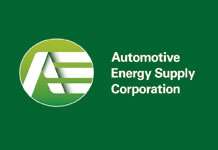Automotive Energy Supply Corporation
 | |
| Industry | Electric vehicle battery |
|---|---|
| Founded | 2007 |
| Website | www.eco-aesc-lb.com |
Automotive Energy Supply Corporation (AESC) is a manufacturer of lithium ion batteries for electric vehicles established 2007 as a joint venture between Nissan, NEC and NEC TOKIN.
History
In 2007 NEC Corporation, Nissan Motor Company, and NEC TOKIN agreed to establish a lithium-ion battery company focused on development to production of batteries for electric vehicles;[1] in 2008 the company was established with a capital of ¥1.5 billion ($14.3million) with a 51:42:7 Nissan:NEC:NEC TOKIN shareholding; the business was to establish a manufacturing site at Nissan's facility in Zama, Kanagawa c.2009, with an initial capacity of 13,000 units per year, rising to 65,000 units per year on an investment of ¥12 billion ($114.6 million). The plant was to be supplied with lithium manganese electrode from NEC TOKIN's factory in Sagamihara, Kanagawa; itself upgraded at a cost of ¥11 billion ($128million). Initial markets were to be forklift trucks, followed by electric and hybrid vehicles manufactured by Nissan.[2][3]
Initial production was based on a manganese spinel cathode, with batteries formed from laminated cells. The battery (L3-10) was a 251 by 144.2 by 9.2 millimetres (9.88 in × 5.68 in × 0.36 in) unit of 13Ah, 3.6V with a power density of 2060W/kg (2.5V @ 20°C).[4]
In late 2008 the joint owners announced they were investing a further ¥100 billion ($1.1 billion) in AESC, establishing an additional factory to increase capacity for around 200,000 vehicles per year.[5] Trial production at Zama began mid 2009.[6]
In 2010 the Nissan Leaf electric vehicle began production, using batteries from AESC.[7]
In 2014 AESC was the second largest electric vehicle battery manufacturer worldwide (after Panasonic), with 21% of the market.[8] In late 2014 Reuters reported conflict within the Nissan / Renault carmaker alliance over sourcing of battery packs for its Sunderland, Tyne and Wear (UK) and Smyrna, Tennessee (USA) car battery plants due to lack of price competitiveness with rival cell manufacturer LG - Nissan was reported to have signed contracts to take all of NEC's electrode production, irrespective of sales.[9] In 2016, Nissan decided to sell its 51% stake in AES, preferring external suppliers.[10]
Gallery
|
References
- ↑ NISSAN AND NEC TO FORM NEW COMPANY FOR ADVANCED BATTERIES (press release), Nissan, 13 Apr 2007
- ↑ NISSAN AND NEC JOINT VENTURE - AESC - STARTS OPERATIONS (press release), Nissan, 19 May 2008
- ↑ Toudou, Yasuto (20 May 2008), NEC Group, Nissan Announce Li-ion Battery Production Plan, Nikkei Technology
- ↑ "AESC: Lithium-ion Batteries for Nissan-Renault's Hybrids, PHEVs and EVs", www.greencarcongress.com, 16 May 2008
- ↑ "Report: Nissan, NEC to Invest $1.1B or More to Increase Li-ion Supply for EVs and HEVs", www.greencarcongress.com, 28 Dec 2008
- ↑ AUTOMOTIVE ENERGY SUPPLY CORPORATION BEGINS TRIAL PRODUCTION OF LITHIUM-ION BATTERIES (press release), Nissan, 16 July 2009
- ↑ Production of 100% Electric, Zero-Emission Nissan LEAF begins at Oppama, Japan (press release), Nissan, 22 Oct 2010
- ↑ Deign, Jason (10 Apr 2015), "Who Is the World's Biggest Electric Vehicle Battery Supplier?", www.greentechmedia.com
- ↑ Frost, Laurence (12 Sep 2014), "Exclusive: Nissan faces battery plant cuts as electric car hopes fade", www.reuters.com
- ↑ "Nissan's battery pullout may energize rivals" Nikkei, 6 August 2016.
_in_Tokyo_Motor_Show_2009.jpg)
